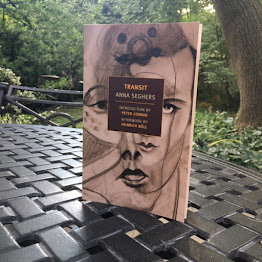The narrator of Anna Seghers' Transit buttonholes the reader and asks that question--with exasperation. With cause. He's a German, persona non grata with the Nazis, stuck in Marseille, in Vichy France. He's neither able to stay, nor to leave, nor to return home. A life less thrilling would be welcome."Aren't you fed up with such thrilling stories?"
Nevertheless, Transit is a story with thrills.
At the start of the novel, the narrator Seidler is in a work camp for enemy aliens in the north of France. He'd already escaped from a Nazi prison into France; as the Nazis roll into France in 1940, the prisoners have to convince the French guard to look the other way as they flee the camp, Seidler escaping for a second time, because most of them would be doomed if caught by the Nazis.
Seidler makes his way south with other refugees, passing through Paris. He agrees as a favor for a friend to deliver a letter to the writer Weidel, but when he finds Weidel's place of residence, Weidel has committed suicide, leaving only a manuscript and his documents. The letter he was meant to deliver, now undeliverable, tells him that the writer's estranged widow needs the documents, as well as Weidel himself, to get a visa so she can leave France. Seidler takes the manuscript, the documents, the suitcase, and goes south to Marseille to deliver all these things to the waiting widow.
So far the story could easily be by Helen MacInnes or Alan Furst. But Seidler is not a naif caught up in a romance, nor a dedicated anti-Nazi; he's just a mechanic who doesn't like the Nazis (and whom the Nazis do not like.) He'd like to settle in Marseille, stop running. He becomes attached to the child of friends, a child who lives in fear of abandonment. The local authorities tell him he can only stay in Marseille so long as he can demonstrate that he's making efforts to leave. So in addition to MacInnes and Furst, you can throw in a bit of Kafka. Everyone in Marseille is facing the same conundrum: you have to have an exit visa, a transit visa for any country you pass through on your way out, as well as an entry visa for your destination country. Any one of those visas can expire while you're still trying to acquire the others.
He helps people who really do want to leave, who have to leave, but for himself he dates, falls in love, discovers pizza. He just wants a normal-ish life, but he's been thrust into a thriller story, albeit one with Kafka-esque twists.
Anna Seghers herself was German and was arrested in 1933 by the Nazis for being a communist. She was released, but she was also of Jewish ancestry and left for France soon after. She passed through Marseille on her way to Mexico where she spent the war years before returning to East Germany after the war. Transit first appeared in English and Spanish translations in 1944, and not in German until 1948, and then only in East Germany. My edition has an afterward by Heinrich Böll for its first publication in West Germany.
I thought it was very good. One of the interesting things about it were the characters who did not want to go. Sure, Rick Blaine decides to stay, but he never seemed like he would be in danger. I mean, he's Humphrey Bogart after all. In Transit, Seidler is not the only one who doesn't want to cross the ocean. Another returns to Lithuania, his home, even though it's almost certainly a death sentence. Others decide to quit running, knowing or suspecting the cost.
It's Women in Translation month! This was translated by Margot Dembauer Betto for New York Review of Books.

This seems a very interesting novel. A woman writer with a male protagonist in such a situation. Am keen to read it.
ReplyDeleteIt's a good one, I think, and you feel she knows her stuff because she was there.
Deletei should have thought Morocco would be more easily accessible than Mexico and why would she go back to E. Ger.? books with a Kafka touch are pretty rare, in that era anyhow, and this sounds like a great read... Helen MacInnes was one of the best adventure story authors i ever read: very exciting stuff! very nice post, thanks...
ReplyDeleteI assume it was Mexico because she could get a visa for Mexico--I think they were more tolerant of escaping lefties in 1940. Morocco probably wouldn't have been. It may also not have felt far enough.
DeleteI wondered if she had read Kafka & I don't know. It's really the posthumous Kafkas, too, like The Trial or The Castle that this suggests--somewhat surreal impenetrable bureaucracies. Chronologically it's possible and since she's German maybe, but I don't know.
Isn't Helen MacInnes so much fun?
My library only has the movie they made of this book. I wonder if it's any good.
ReplyDeleteI've been curious about it, too, but haven't seen it yet.
DeleteFunny, I always thought this was a more cerebral work, not thrilling at all. It sounds like a great choice for a hot and humid August!
ReplyDeleteIt definitely has got a serious side to it, but it's also a good read.
Delete